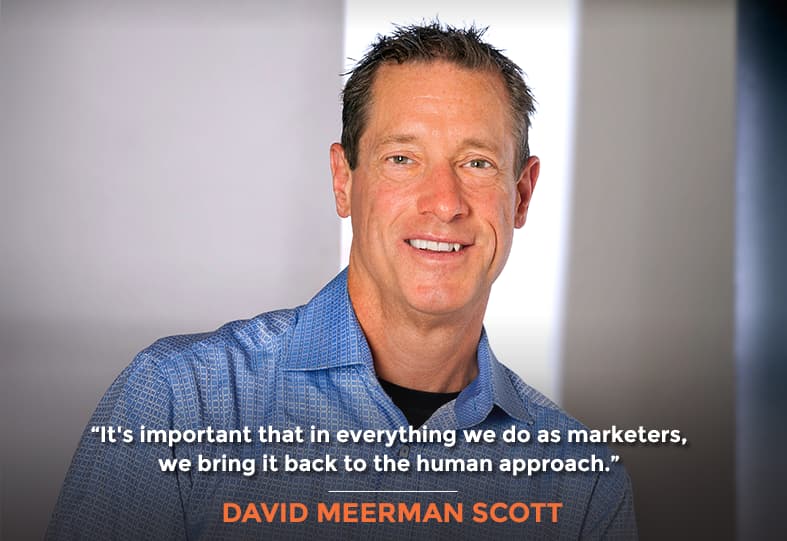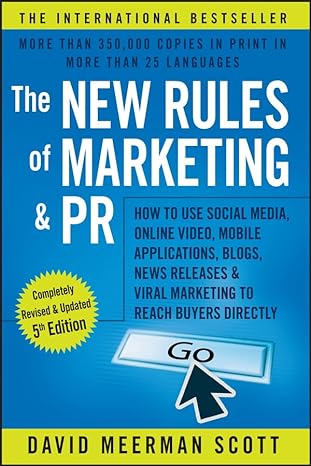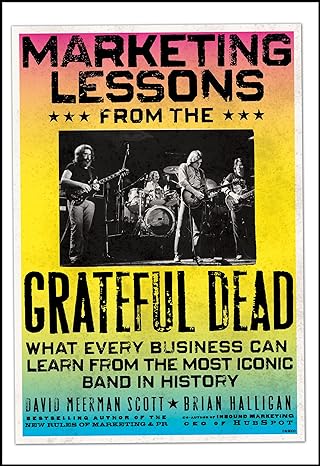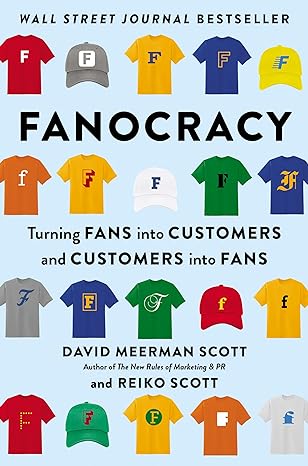We live in a world where technological advances happen at breakneck speed, making it all the more imperative for us to intentionally disconnect from tech and engage in the world around us.
In today’s show, I delve into the heart of this endeavor with David Meerman Scott, a visionary in business growth strategy and the bestselling author behind influential works like Fanocracy and The New Rules of Marketing & PR. David, whose insights have reached global audiences through translations into 30 languages, sheds light on the often-overlooked power of humanity in the digital marketing realm. Our conversation ranges from exploring innovative AI apps to practicing attention hygiene by being mindful of exposure to social media. We explore the transformational role of AI in marketing, emphasizing the balance between leveraging cutting-edge technology and nurturing genuine human engagement. David also talks about his inspiration for writing books he wrote on his own, as well as the book he co-authored with his daughter.
Join us to discover how to create lasting bonds in this rapidly evolving landscape, where the human spirit remains the cornerstone of impactful marketing. Without any further ado, on with the show!

In This Episode
- [02:13] David Meerman Scott emphasizes the importance of the human approach in marketing, prioritizing relationships over revenue.
- [05:16] David advocates for a metaphysical approach to marketing, explaining the impact of AI on marketing and its potential to automate tasks.
- [14:13] David predicts that large language models (LLMs) will evolve to provide more transparent and accountable results and compares the rise of LLMs to the file-sharing service Napster.
- [23:33] David acknowledges the addictive nature of social media and takes steps to avoid it, such as not using it during off time and engaging in activities that don’t involve technology.
- [26:01] Stephan and David express concern about the potential for social media algorithms, and David clarifies the difference between allowing content publication and amplification.
- [35:55] Stephan asks David how to create an environment conducive to writing and his secrets to selling a million books.
- [46:20] Here’s how to connect and learn more from David Meerman Scott.
David, it’s so great to have you on the show.
Hey, Stephan. It’s good to be here.
First of all, what is the next thing, in your opinion, as far as the thing that people are sleeping on or missing the memo? Everybody is hot on AI and on the security and privacy going by the wayside, but what’s something that is a sleeper or something that people are missing that’s coming that will be really big?
Humanity. It’s something I’ve been talking about now for quite a while. The more technology we have, the more artificial intelligence-driven marketing we have, the more companies automate, the more there is an opportunity for companies to show their human side and engage with people in a way that brings people together.
This is such an important time in the history of marketing because so many organizations are not focused on being human and suffer as a result. Whether it’s sticking you on hold on the 800 number when you call in as a consumer, whether it’s just understanding your customer numbers, the only thing they care about. There are so many examples we could talk about. But to me, it’s important that in everything we do as marketers, we bring it back to the human approach.
How are you applying this human approach in your marketing? You have 13 books. You could just be building a fan base and a platform and all that, or you could be building rapport and relationships with your readers and prospects. What are you up to?
It’s important that in everything we do as marketers, we bring it back to the human approach.
I am not taking on new clients by focusing on the revenue it might generate. Instead, I’m taking on new projects, clients, and engagements based on what will be interesting, fun, and better for the universe.
I always think that the more you give to the universe—I call it the universe, call it whatever you want—the more you get back. That’s the approach I have been taking for quite some time, which seems to work best for me. Anything I can do that generates attention without spending money, anything I can do to share my ideas such that I never have to place a sales call—and I haven’t had to place a sales call in 22 years—will be great.
For me, that’s about sharing and providing many things for free on my blog, LinkedIn, and other social networks, having an approach where I am pushing as much of myself out there as possible so that people find me. They may buy a book and want me to speak at their event. That seems to work for me, and it seems to work for the organizations that employ those ideas.
It sounds like a metaphysical approach to marketing. You said giving to the universe, and the universe gives back. How are you applying metaphysics, intuition, and guidance from your unseen support team? How are you applying this in business and for your clients and their businesses?
I think the more helpful you are, the more you truly are giving because you want to give instead of making everything some kind of transaction. I started talking about it in terms of giving away content. More than 20 years ago, the idea was that the more you give from the perspective of content on the web, the better it is. That approach works great.
There are so many organizations that don’t do that. Instead, they are all around pushing their own products and services, pushing their own ideas and setting things up in a way that becomes simply transactional. Sure, that’s another way to do business. Who am I to say that my ways work better? But besides the idea that, the ideas that I espouse to work, it also means it’s more fun to do business.
The more helpful you are, the more you truly are giving. You want to provide instead of making everything as a transaction.
When you’re out there enjoying yourself and sharing things because you want to share them and accepting client engagements because those might be the most interesting to you, I think ultimately you live a better life than if you’re just working on a transactional basis and taking on assignments that you think might pay more but in the end, probably don’t.
How are you incorporating AI into the strategies that you recommend to companies these days, and where do you see things in just, let’s say, three years? Will it be radically different in terms of how people and businesses will be doing their marketing?
AI is probably the most significant thing that I’ve seen since 2007. The first iPhone was launched, and I got myself an iPhone. I don’t use it now, but I still have it. Then, social networks took off in 2007.
Artificial intelligence now and what it can do for marketers is super significant. However, we want to ensure we remain human in a world of artificial intelligence.
But here are a few things I’m doing and using which have been helpful to me. You are recording this, but if I were recording this, I would run it through a transcription engine to get a transcript of our discussion. Then, I might run it through a large language model to summarize it and provide bullet points. All those things are super easy to use. There are different AI tools for it.
I’m not that great at headlines, so I will frequently take a draft of a blog post or a section of a book and drop it into ChatGPT or something similar and see if it can generate at least the starting point of a headline for me and usually, it works pretty well.
I am a big fan of a company called lately.ai. Its tool takes the long-form content I’ve created and turns it into short-form content. In practical terms, the way that works is if I write a blog post, it could be 500 words or 750 words. I used to look at that blog post and try to come up with a couple of tweets related to that blog post.
But now I use Lately AI to do that. It automatically takes my blog post and then cuts it into a number of tweets. It might be 10 or 15. Then, I can use the tool to schedule those tweets once a day, every three days, or twice a week.
That’s been helpful for my business because it’s allowed me to automate something that I wasn’t very good at, to begin with, and that was generally time-consuming, which is turning those long-form blog posts into short-form tweets.
The other thing that I’ve done, which has worked out well, is that I’ve taken all of my roughly 2000 blog posts that I’ve written since 2004, plus the content of six of my books, uploaded them to a proprietary database that I put ChatGPT over the top of. I’m able to query my private database. I’ve worked with a couple of clients who have done the same thing.
Artificial Intelligence is significant to marketers. However, we want to remain human in a world of AI.
Now, in every way that I like to use AI, and in every way that I suggest to my clients that they use AI, and every way that I talk about AI in my books and so on, what I constantly come back to is the idea that for something like the large language models like ChatGPT, they’re just predicting what the next word in a string is using public internet data. Yes, that has value, but by definition, you’re using something that already exists, number one, and by definition, you’re using the next predictable outcome, number two. It’s less useful to be super creative.
I like anything that uses your proprietary content and makes it better. I shared with you two examples. Lately AI has taken my existing long-form content and created new short-form content from it. My own proprietary database of my own content is a way to create new blog posts, but only from my own content, not using public internet data.
Another great example of how I use AI and recommend it to people is that I’m an advisor to HubSpot. I’ve been on their advisory board since 2007, when they had $250,000 in annual revenue. Now, they’re at well over $2 billion in annual revenue.
I’ve also been a HubSpot customer for quite a number of years. They have something called ChatSpot, which is part of their service—they are a CRM, marketing sales and customer support software service—they allow me to query my customer data within HubSpot using natural language, which AI drives.
I love that because I’m not a power user of their software. I don’t know how to get all the data I might want. Before I go to a speech in, say, South Korea, I might want to find out if I have any blog subscribers located in South Korea. I wouldn’t know how to find that data, but with ChatSpot, I just entered a natural language query, “Do I have any blog subscribers located in South Korea?” It gives me an answer instantly.
I like anything that uses your proprietary content and makes it better.
Those are three ways that I like to use AI. I suggest people use AI, which is all related to their own proprietary content, the most interesting way that AI is being used. Less so is using AI to query public internet data.
Three of my books are in the 187,000 books used within the ‘Books3’ database that many of the AI large language models have been trained on, and the New York Times data was also used to train, and many other news publications were used to train. I’m convinced that we will soon be entering an era where that content will need to be removed, cited, or compensated.
We won’t be able to query the entire public internet database, books, and everything forever. That is going to change the way that we are interfacing with these different AI engines.
Is there some class action lawsuit underway to compensate the authors of that Books3 database or any of these other databases?
I know nothing about Books3 regarding class action, although individual authors have sued various people. The New York Times, of course, famously has sued OpenAI and Microsoft for using their content, and what that says to me is the New York Times probably approached them initially and was unable to resolve the dispute, so they decided to sue.
As these things resolve, the output of chatbots, for example, ChatGPT, is less likely to be what it is now, which is on the text-based version. ChatGPT, you type in a query, and a natural language result comes back, but there are no citations to the original content.
Artificial intelligence-driven marketing lacks a personalized touch. If your marketing features humanity and personal connections, you’ll stand out. Share on XI think it’ll end up being probably more like the way Wikipedia now works, which is you enter a query, you get to find a Wikipedia entry for whatever it is you’re looking for, and it’s not just the text; it’s the text plus the citations to the original content. I suspect that’s where we’re going. We’ll see, but I suspect that’s where we’re going.
I hope so, and that’s good for content creators and consumers rather than having a bunch of the Internet closed off to the LLMs. That doesn’t help anybody.
That’s probably right. It’s a lot like Napster a couple of decades ago. Napster came along and provided file sharing for anybody to be able to get music without having to pay for it.
Of course, that’s what the market wanted. Consumers wanted to get lots and lots of music in digital formats. They didn’t want to buy an entire $10 album to get one song, which was the concept that had been active prior to that.
ChatGPT and other chatbots are among the fastest-growing uses of technology ever.
Napster comes along, and the music industry shuts it down. A couple of years later, iTunes started, allowing you to buy one song initially, and then Spotify, Pandora, Apple Music and other things also came around a bit after.
But now, you can subscribe to tons of music and get what you want for a small subscription fee. Although there are a lot of people who complain about it, music artists and record labels make money from it. Consumers get what they want.
I suspect these large language business models will change accordingly because this is what consumers want. This is one of the fastest-growing uses of technology ever, ChatGPT and the other chatbots.
At the same time, the people who create this content, companies like the New York Times and authors like me want their work to be compensated. But for me, it’s much more of it, not so much compensated, but I want my work to be cited.
As many times as I’ve searched on an esoteric topic, for example, I wrote a book called Marketing Lessons from the Grateful Dead. If I do an esoteric search about marketing and the ‘grateful dead,’ I see my content come up, or I invent a concept called newsjacking. It’s taken off. It’s become popular, so other people are writing about it.
If I search on one of the chatbots, ChatGPT or whatever, and search on newsjacking, I see essentially my content appear without citing me as the originator. Things will change. It will shake out, and seeing how it shakes out will be interesting.
Now, one thing that will shake out or evolve quite significantly in regards to this is that people become increasingly skilled at using the AI, at least a first draft creator, if not in the entire content piece finisher.

That means that a website that would normally, with the amount of available time and resources for a company or a person, could be a hundred times larger, a thousand times larger, with the help of AI.
Or it could be the opposite. It could be that you hack together a first draft of something and then drop it into the AI to get it cleaned up, spell check, proofread, and all that sort of thing is another way to go.
I don’t think it’s effective for companies to create content for their blogs or whatever only using these AI tools because, number one, it’s not original and original writing is interesting because it’s got unique turns of phrases and unique ways of thinking about ideas. It’s hard for AI to come up with that.
You can’t copyright it, which is another reason companies should avoid it. You can’t copyright content that was generated from a machine. It’s not as interesting as something that you can create yourself. I don’t know. We’ll see what happens.
I don’t think it’s effective for companies to create content for their blogs by only using AI tools because it’s not original.
There are a lot of people who take the opposite stand as I do and are massive cheerleaders for these sorts of ideas, and that’s great. I love that there’s a debate about them, and who knows where it will shake out. I suspect that the ways that I’ve been talking about it are the direction we will go.
I recently heard of a study that Amazon Web Services, their AI lab, put together and found that a shocking amount of the web is already made up of poorly quality AI-generated and translated content.
I see it all the time. Yeah, 100%, that is exactly what’s happening. There’s an explosion of this content, and it’s happening right now. Companies are not doing themselves a service if they put that content out.
I have this theory that there will be some certification, just like there’s organic certification for AI-free books. Like, “No AI is involved in generating this 400-page book.”
I’m working on the ninth edition of my book, The New Rules of Marketing & PR. This book originally came out in 2007. I’m holding the eighth edition in my hand and working on the ninth edition. In my contract for the ninth edition from Wiley, my publisher, there was a clause about AI-generated content in the book. It was the first time that that clause has appeared in there.
That’s interesting to me. I think you’re right. Especially the large publishers—I suspect small publishers, too—are now specifically requiring authors to sign as part of their agreement to disclose how they do or don’t use AI in creating their work.
I think the publishing industry, not just newspapers but book publishers are, I would guess, quite scared of the future as far as how people are going to consume content, whether they’re going to pay for it, whether it’s going to be from AIs that are not copyright-enforced or anything like that. The idea of a million-book bestseller might not be in the future for publishers. I don’t know. What do you think about that?

Interesting question. I think publishers have been paranoid for a long time. They’ve been paranoid since the birth of the Internet. Things have changed dramatically since the Internet. Ebooks came along, and they did a good job with those. Audiobooks came along, and they did a good job with those.
But yes, all those models are changing, and publishers must figure out how they will survive in the new world. Of course, there’ll always be niche publishers, but is there still room for very large publishers? I don’t know.
I sure hope so because not only do they publish my books, but I love to read, and I’m constantly buying. In just this week, I bought three hardcover books. I very much support authors who are creating great content. Reading as a form of enjoyment and learning is not going away. It’s just a matter of how people will read.
But the thing is that people are becoming more and more instant gratification-oriented. The dopamine—the reward center of our brains—is being hijacked by these different apps, social media platforms, etc. We’re being trained to have the attention span of a goldfish. Reading an entire book is not in the cards for most people in the future.
That might be true of many people, unfortunately. I purposely push myself to avoid that and not get sucked into those social networks as much as I could get sucked into them. Every day, I ensure I’m mindful of when and how I use social media. What I love to do on my off time generally involves not having social media near me.
I love to do long-distance backpacking. I’m a surfer. I love to go to live music events and do various things. I try to avoid that whole social media thing.
You’re right. They are addictive, especially on Facebook and YouTube. The Facebook and YouTube algorithms are among the most destructive technologies ever invented. They’re among the most destructive technologies ever invented because, as you said, they push you into an ecosystem that rewards negativity, conspiracy, and polarization.
Reading as a form of enjoyment and learning is not going away. It’s just a matter of how people will read.
It’s just a simple calculation by companies like Facebook or Meta that when people are angry, they spend more time on a platform. When people are outraged, they spend more time on a platform.
The social networks’ AI algorithms are tuned to get people to stay on the platform as long as possible because the longer you stay on a platform, the more money the social media company makes because, the more ads they can sell. Simple calculation. They know that when you’re angry, you’re likely to stay on more.
This is what’s led to so much polarization in the United States politically. It’s led to so many conspiracy theories. It’s led to many things going on in our culture that can directly be drawn back to the social media algorithms, especially those of Facebook and YouTube, because that’s where people spend so much of their time.
It’s super dangerous, and I think those social networking companies know it but are generally unwilling to address it meaningfully.
Earlier in the conversation, you mentioned the term that you came up with, newsjacking, and there might be a corollary here of outrage jacking, that Facebook is hijacking and monetizing outrage, further amplifying it.
Keeping in mind that Facebook is not the company that creates the content. They’re just the company that amplifies it. There’s been a disservice to humanity when there’s been so much discussion about free speech recently. When it’s not, people are not talking about the right thing. There is so much talk about free speech and freedom going on.
Social media algorithms aim to keep users on the platform longer to increase revenue.
You’ve always been free to create content. Going back thousands of years, you could write it down, publish it in a newspaper or magazine, or put it on a piece of paper and stick it on a tree. You can publish that content.
What’s different now is that those social networks and their algorithms can expand the reach and augment the number of people who can see something so that you can create a piece of content that millions could see in a very short period.
People have been complaining that it’s freedom to be able to communicate. No, as far as I’m concerned, there should never be a freedom that says your content can be amplified. You can create it, but there should never be so-called freedoms around amplification. The leaders of social networks and politicians who don’t understand have fallen into the trap of mixing the idea of freedom to create with freedom of amplification.
They should be two different things. Amplification has very dangerous connotations. If I create content, my friends can find it, even if it’s not amplified. But if I were to create a piece of content, and then Facebook were to amplify it, that’s a very different thing. It’s not something that many people are prepared to think about the ramifications of.
I’m frightened about the upcoming US election in 2024, which revolves around the idea of amplification and potentially all the deep fakes that will be created and whatnot. It’s the dark side of what’s going on with AI.
A movie on Netflix, The Great Hack, exposed how bad it can be when these PR firms or whatever they want to call themselves are manipulating public opinion through nefarious surreptitious means, creating fake sock puppet accounts and all that on social platforms, swaying public opinion and causing a different outcome in elections. It’s wild to think about.
And we’re in for some issues this particular election cycle, especially because these social media algorithms go so quickly, where something can be created and go out so fast.
I suspect maybe the Super Bowl, we’ll start to see some examples of what’s coming up very soon, but November 2024 is going to be a time that we all have to pay attention to what’s going on and always be thinking, “Is this real or is this not real?”
Yeah, crazy times. It’s not the same thing as having the freedom to amplify content as having the freedom to create the content. This creates a potential for a curation algorithm like Facebook’s or YouTube’s to become a censorship algorithm.
How do you balance that so that the powers pulling the purse strings are not censoring dissenting opinions and things they don’t want to get amplified and thus don’t even know if they should be?
Choose projects that ignite your curiosity, delight your spirit, and contribute to the universal greater good. Share on XIt’s a challenging topic. I wouldn’t use the word censorship when it comes to amplification. That’s where there’s a lot of misunderstanding today. True censorship is when you say, “No, you can’t post that.” The platforms can say, “Oh, okay, you can publish it. We’re just not going to amplify it.”
Then, if you get into a situation where they want to amplify one side and not the other, that’s super dangerous. I’m not sure that we saw many examples of that. People seem to think that there were a lot of examples of that, but as far as I’m concerned, there hasn’t been a lot of that. However, there’s a big difference between simply allowing something to be published and amplifying it.
Are you familiar with the concept of shadow banning?
Tell me what that means.
When the content creator is not notified that their account is being just dialed down, anything that they post automatically doesn’t get any reach to the degree that nobody sees it, maybe even not their mom, but they’re not notified. It’s a shadow ban.

I’m definitely familiar with that.
It’s certainly an interesting time to be alive. Our parents, grandparents, and so forth didn’t have to deal with many new things, like getting shadow banned.
It keeps bringing me back to how important it is to remain human in this world, whether you, personally, your family, what you do as a marketer, and how you engage with the world as an individual or an organization. The deeper you dig into the AI world, the social media algorithm-driven world, and the world of online content, the less human you become.
That’s coming from the guy who wrote the New Rules of Marketing and PR, which is about how to do all those things. I’m not saying I don’t do the things I write about in my books, but I am saying, make sure that you disengage, make sure that whatever it is you love to do in the offline world, you do more of it.
You spend more time with your family, outside in nature, face-to-face with your customers, or engaging with your employees, person-to-person.
These things will help a lot and make you a better person, and perhaps even live longer because you’re engaging in the way that, as you said, your grandparents engaged in.
I’ve been thinking a lot about that recently, and it’s super important for me. So whenever I can disengage from the online world and jump deep into the offline world, I’ll take that opportunity.
That’s all great advice. I love that. I’m totally on board with that. Somebody who’s an information worker might have a real problem with the time they have to spend indoors at the computer because that’s their livelihood. They can’t be outside on hikes and face-to-face meetings all the time. They’ve got to be on Zoom. They’ve got to be coding stuff and writing stuff on the computer.
The deeper you dig into the AI world, the less human you become.
What tips do you have for that situation? What are some of your best practices for attention hygiene at a computer or on your phone?
As much as you can, do some movement when you’re on. Right now, as we’re talking, I’m standing up. That’s helpful. If I can take a Zoom call while I’m outside walking, I will try to do so. I block out parts of my day.
That’s really important. I typically will block the entire morning up until lunch. That’s the time that I have to myself. I do some exercise. I often have breakfast with my wife. If I can get outside, I get outside. During the summer, almost every morning, I’m outside.
Then I have a period, typically after lunch until about five or six, where I concentrate my online, back-to-back Zoom calls so that it’s all happening in one chunk.
Then, when I read, I typically read print books. I do have a Kindle for e-books when I’m traveling on airplanes. I listen to audiobooks when I’m in the car, but as much as I can, I try to be unplugged at home and do magazines and print books.
That works for me. Physical exercise, getting outside my entire morning as much as I can. There might be an exception here and there, but most mornings, I’m unplugged for the most part until midday. Then I have my meetings, Zooms, and social engagement on social media, all concentrated within a short time, mid-afternoon.
As a prolific author, how are you creating an environment conducive to writing a 400-page book or whatever length you are trying to hit? Is writing a good, cohesive, compelling book required a certain skill set? Everyone has their approach to their writing style or whatever they carve out as a certain number of hours a day. They have to write something or just stare at the screen. What do you do?

Those morning hours that I said I’m not doing Zoom and plugged into social media typically, at least a couple of those hours, is when I’m at my best to write. I have a beautiful, light-filled space to write.
There are a couple of other things that I think about when I write. Number one is that I always want to create something original for myself. I always think about the patterns in the universe I’m seeing that other people aren’t seeing, and that usually becomes the basis for a book.
I wrote This book, Fanocracy, with my daughter, Reiko, about building fandom culture. She and I had some ideas that we saw patterns in the universe that others weren’t seeing, and we wanted to write them down.
This is a book that came out a decade ago. It’s called Marketing Lessons from the Grateful Dead. I co-wrote it with HubSpot co-founder and CEO Brian Halligan, and Bill Walton, the NBA Basketball Hall of Famer, wrote the foreword to it. We saw patterns in the universe that the way the Grateful Dead did their marketing, although they didn’t call it marketing, was unique and worthy of talking about.
I always think about the patterns in the universe I see that other people don’t see, and that usually becomes the basis for a book.
The first thing I do when I write something is say, “What is unique and interesting? What is the pattern in the universe that I’m seeing that other people aren’t seeing to make sure that what I’m writing about is truly original and truly worthy of spending the time to write about it?”
Then, as I’m writing a project, I always think of it as not writing 400 pages because that’s daunting, but rather writing 150 blog posts or however many blog posts it is to get to the word count I want.
It’s much easier to think about how to write one blog post a day for 150 days, which becomes a book, than to think, “Oh my gosh, I have to write 70,000 words.” That’s daunting to me. But I am writing a blog post a day for 150 days, and I’m sure I’ll take time off. So, over a year, that’s much easier to handle.
I love that. That’s a great approach. How do you end up selling a million books? That’s a rare feat to get to a million books sold. You have that across all your books. Sometimes, it’s just one big hit, and then it’s that one-hit wonder, but regardless of how the million book mark is hit, you’re very rare in the book authorship world. What are some of your secrets?
It is rare to sell significant copies of books. I don’t know if I would call it a secret because I always talk about it, but probably the most important thing is what I just talked about. What’s your original idea? The way I like to think about it, what is the pattern in the universe you see that nobody else has seen?
I’m a big fan of live music. I’ve been to over 950 live music shows since I was 15 and 104 Grateful Dead concerts since I was 17. What’s interesting about live music is that some bands are cover bands. They play other people’s music—a noble cause. They have fans. Then, some people write original music and perform their own music.
When thinking about writing, I always push people to be original. Don’t be a cover band. Create a book idea that’s wholly unique and wholly original. But most books I see—I’m often asked to write endorsements and so on—are, in one way or another, you’re either a conscious or unconscious rehash of ideas that others have written about. The first step is just to have some great and original content.
Modern social networks and their algorithms amplify reach and expand the instantaneous visibility of content to millions. Share on XThe next step I would suggest is just getting those ideas in the book in front of as many people as possible so that more people are exposed to the ideas. Then, some people may leap to spend $20 or whatever the dollars are on your book. The way that I’ve generally done that is by figuring out how I can get my ideas exposed to as many people as possible.
When a new book comes out, I frequently tell my speaking clients, and I put it on my website and other places, like, “Hey, if you want me to speak for free, this is an opportunity. Normally, you have to pay me the big bucks to have me speak at your conference, but for a very limited time, if you buy a copy of my book for everyone in the audience, I will show up and speak at no charge.” That’s one way I do it.
Another way I do it is through people like you, people who have podcasts and video shows, and people who are creating content that might want to share mine.
When my book, Fanocracy, launched several years ago, leading up to the launch date, I recorded over 150 podcast episodes with others. I don’t have my podcast, but with other podcasters like you, I asked them if they would please hold the episode until the book’s launch date.

So, 150 podcasts dropped the same week the book came out. That was enough interest generated, enough interest with people, and people bought enough copies that the book hit The Wall Street Journal bestseller list that week.
When I share ideas like that with people, it seems daunting, and the vast majority of authors won’t do it because it’s a big effort to do either. Traveling the country speaking for free is a big effort if you’re normally a paid speaker. It’s a big effort to record 150 podcast episodes over six months. It’s a big effort.
Most people will happily spend 500 hours writing a book, but when I say to them, you’ve also got to spend 500 hours marketing the book, almost nobody does that. I think it’s a matter of just making sure you focus on that marketing aspect of the book as well.
Then, I’ve found that my books have done extremely well in markets outside the United States. I’m published in 30 different languages, and that’s been great for me to get speaking engagements outside the US.
I’ve spoken in nearly 50 countries, and sharing my ideas in those different countries is super fun. I’ve been to Rome and Seoul, South Korea, in the last couple of months, and it’s been great. My books are in Italian. My books are in Korean, generating interest, and some might want to have me come.
Making those ideas spread globally by eagerly participating in virtual and in-person events in other countries is a great way to get the ideas of a book out there.
Amazingly, you get your book published in so many different languages. Was that something you had to spearhead, or was that just completely handled by your publisher?

The way the publishing world works is that if somebody wants to publish—I don’t think I have a copy here to show you—a book in a different language, let’s say South Korean in that example, the publisher reaches out to the American publisher who holds the rights and says, we’d like to publish the book. The South Korean publisher buys the rights from the American publisher, and then they can create a South Korean version of my work. That’s how it works.
The challenge is that you have to generate interest in the book so that foreign publishers can find it. Then they want to publish it. Part of that is hitting a bestseller list. Part of that is getting some sales.
Back to the Fanocracy example, when this book came out, I knew that if I was able to generate enough sales in a week for it to hit the Wall Street Journal bestseller list—which is a weekly list; it was published every week—that generates attention among publishers outside the United States.
I worked my butt off recording 150 podcasts, and among other things, that helped to generate enough sales to hit the Wall Street Journal bestseller list. Then, publishers outside the United States read that Wall Street Journal bestseller list every single week and then looked for the types of books they would like to publish.
Although AI is useful and ever-evolving, we can always showcase our humanity and personalize our marketing. Share on XFanocracy is interesting. It’s a book about fandom culture. Maybe we should see if the rights are available in our language. And then they reach out. It takes a lot of effort to make it happen, but I find it’s something I enjoy doing.
It pays off in many ways, not just for you but for many people worldwide. You reveal your light, share your wisdom with the world, and make the world a better place.
Thank you. It’s very kind of you to say so.
I know we’re out of time. If our listener wants to learn from you more, where would you want to send them?
If there’s an interest in fandom culture, I’ve got a website at fanocracy.com. You can learn all about my ideas, find my blog, and inquire about speaking at davidmeermanscott.com.
In most social networks like Instagram and X, I am @dmscott.
Awesome. Thank you, David, and thank you, listener.
My pleasure, Stephan. It’s good to meet you. Thank you very much.
All right. Thank you, and we’ll catch up with you in the next episode. I’m your host, Stephan Spencer, signing off.
Important Links
Connect with David Meerman Scott
Apps and Tools
Books
Businesses/Organizations
People
YouTube Videos
Your Checklist of Actions to Take










About David Meerman
 David Meerman Scott is a business growth strategist, advisor to emerging companies, and international bestselling author of 13 books, including “Fanocracy” and “The New Rules of Marketing & PR.” His books are published in 30 languages, from Arabic to Vietnamese, and have sold nearly a million copies.
David Meerman Scott is a business growth strategist, advisor to emerging companies, and international bestselling author of 13 books, including “Fanocracy” and “The New Rules of Marketing & PR.” His books are published in 30 languages, from Arabic to Vietnamese, and have sold nearly a million copies.







Leave a Reply